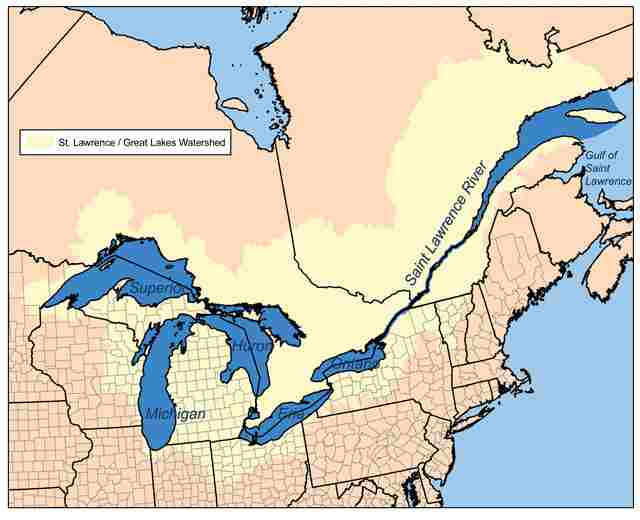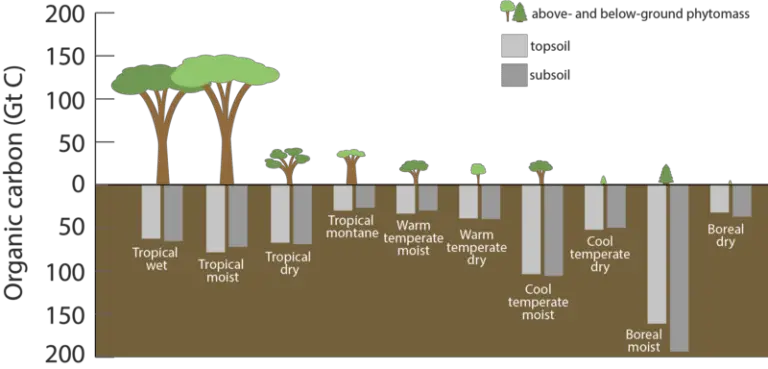5 Effects of Environmental Pollution Explained
Effects of environmental pollution are; resource depletion, economic recession, ecologic disruption, hazard facilitation, and health problems.
This article discusses the effects of environmental pollution, as follows;
1). Resource Depletion (as one of the Effects of Environmental Pollution)
Pollution can lead to resource depletion, which is itself another form of environmental degradation.
Resources that can be depleted as a result of environmental pollution are; water, air, soil, energy, minerals, fossil fuels, and biomass in the form of agricultural waste, municipal organic waste, and forest resources.
The introduction of pollutants into hydrological systems like rivers and seas, leads to loss of water resources. These resources are ‘lost’ because they become unusable for various purposes, and may only be recovered through energy-intensive processes like desalination and reverse osmosis.
Loss of forest resources, or deforestation; may be caused or facilitated by air, water, or soil pollution [1]. These events can reduce the fertility and productivity of soil, or may directly poison forest vegetation and prevent its growth.
Mineral resources can be lost when pollutants infiltrate natural reserves, and alter the quality and usability of these resources.
Resource depletion may also occur simultaneously with environmental pollution. An example of such a scenario is oil spill; whereby pollution occurs as a result of energy waste, when petroleum products are lost to the environment.
2). Economic Recession
The effects of environmental pollution ultimately affect the economy.
Economic recession may result from resource depletion, which is an effect of pollution.
When water, air and soil resources are lost due to pollution, the economic value of these resources is also lost.
The health implications of pollution also have economic implications.
Air pollution decreases economic productivity by facilitating health problems that reduce the availability and effectiveness of labor.
Soil and water pollution can both affect agricultural productivity, leading to socioeconomic problems like hunger, unemployment and food insecurity [2].
In the power generation sector, pollution can cause economic recession through the loss of energy resources, and through extra expenses on carbon taxes and environmental remediation measures.

3). Ecologic Disruption (as one of the Effects of Environmental Pollution)
Environmental pollution can disrupt essential processes in the ecosystem.
When pollutants are introduced into lakes, forests, grasslands, seas, rivers and tundras, they alter the quality of these ecosystems and reduce the potential for survival of organisms.
Severe pollution can lead to loss of habitat and biodiversity [4], and can reduce the efficiency and effectiveness of processes like biodegradation, by which energy and materials are cycled in the ecosystem. It can also reduce the effectiveness of carbon sinks and carbon sources in performing their natural roles.
4). Hazard Facilitation
Some anthropogenic and natural hazards are induced by environmental pollution.
These include acid rain, which can be caused by the dissolution of pollutants in air.
Air pollution can also involve greenhouse gases, which contribute to climate change. Other hazards which may be facilitated by climate change include flooding, landslides, drought and erosion.

5). Health Problems (as one of the Effects of Environmental Pollution)
The effects of environmental pollution on human health are numerous, and include respiratory, cardiovascular, dermatological and endocrine illnesses.
Asthma, bronchitis, and lung cancer are some health problems which could arise from inhalation of air pollutants like particulate matter [3].
Ingestion of, or contact with polluted water can lead to skin infections and organ dysfunctions.
These health problems all have economic implications, and could increase mortality rates.
Conclusion
Effects of environmental pollution are;
1. Resource Depletion
2. Economic Recession
3. Ecologic Disruption
4. Hazard Facilitation
5. Health Problems
References
1). Chakravarty, S.; Ghosh, S. K.; Suresh, C. P.; Dey, A. N.; Shukla, G. (2012). “Deforestation: Causes, Effects and Control Strategies.” Global Perspectives on Sustainable Forest Management. Available at: https://doi.org/10.5772/33342. (Accessed 27 October 2022).
2). Gupta, G. S. (2019). “Land Degradation and Challenges of Food Security“ Review of European Studies 11(1):63. Available at: https://doi.org/10.5539/res.v11n1p63. (Accessed 27 October 2022).
3). Lee, Y.; Lee, H.; Choi, S.; An, M.; Jang, A. (2021). “Effects of Air Pollutants on Airway Diseases.” International Journal of Environmental Research and Public Health 18(18):9905. Available at: https://doi.org/10.3390/ijerph18189905. (Accessed 27 October 2022).
4). Oleksyn, J.; Reich, P. B. (2002). “Pollution, Habitat Destruction, and Biodiversity in Poland.” Conservation Biology 8(4):943 – 960. Available at: https://doi.org/10.1046/j.1523-1739.1994.08040943.x. (Accessed 27 October 2022).


